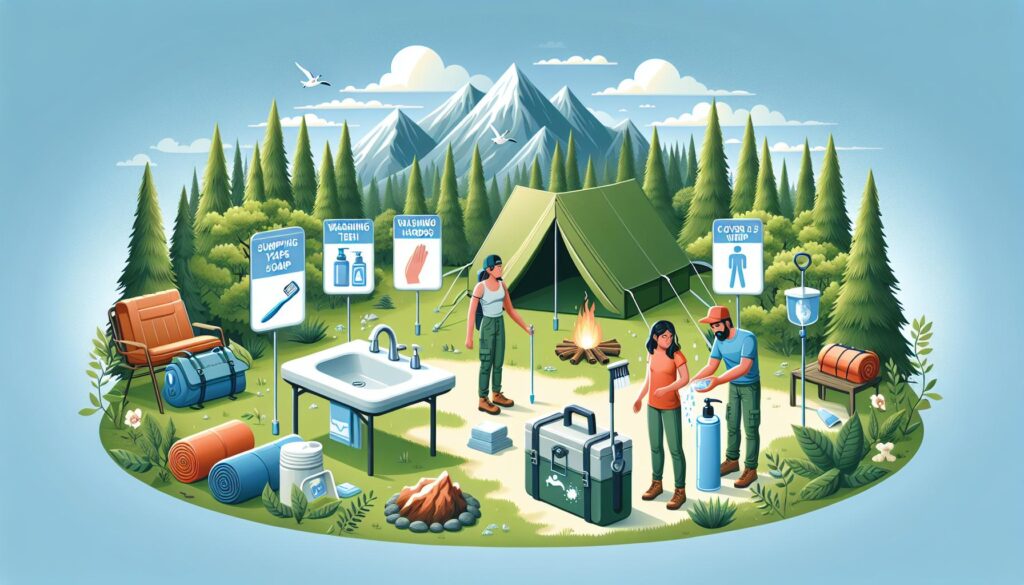Are you planning a camping trip but worried about maintaining cleanliness in the great outdoors? Fear not! With a few essential items like biodegradable soap, wet wipes, and hand sanitizer, you can stay fresh and clean even while camping.
Camping is a fantastic way to escape the daily grind, reconnect with nature, and take a break from technology. However, the lack of running water and modern amenities can make maintaining hygiene a bit of a challenge. But don’t let this deter you from your adventure! With the right approach and a few key products, you can stay clean and comfortable throughout your camping trip. This article will guide you through practical and eco-friendly ways to maintain hygiene while camping.
Table of Contents
Why Good Hygiene Matters When Camping
Good hygiene is not just about comfort; it’s also about health. When you’re camping, you’re exposed to dirt, germs, and bacteria. By keeping yourself and your camping gear clean, you can reduce the risk of infections and illnesses. Washing your hands regularly and disposing of waste properly are crucial steps to prevent the spread of diseases and ensure a safe camping experience for everyone.
Moreover, a clean camping environment enhances your overall experience. It helps to eliminate unpleasant odors, increases comfort, and promotes a sense of well-being. Keeping your camping gear clean and organized also means that everything is easily accessible and in good condition, adding to the enjoyment of your trip.
Essential Hygiene Practices For Camping
When camping, cleanliness and hygiene should be top priorities. Hand hygiene is particularly important to prevent the spread of germs. Always have hand sanitizer or soap and water on hand to clean your hands before and after meals, after using the restroom, and whenever they are visibly dirty.
Personal hygiene is equally important. Pack essential items like toothbrushes, toothpaste, and a towel. Take regular showers or freshen up using wet wipes. Dispose of sanitary products properly to keep the campsite clean and free from potential health hazards.
Keeping the campsite clean is also crucial for a comfortable and safe camping experience. Dispose of trash properly, store food in secure containers to avoid attracting animals, and clean cooking surfaces and utensils to prevent contamination. Always follow Leave No Trace principles to minimize your impact on the environment.
| Essential Hygiene Practices | Personal Hygiene | Campsite Cleanliness |
|---|---|---|
| Proper hand hygiene | Carry personal care items | Dispose of trash properly |
| Maintain personal hygiene | Take regular showers | Store food in secure containers |
| Keep campsite clean | Dispose sanitary products properly | Wipe down cooking surfaces and utensils |
Hand Hygiene While Camping
Proper hand hygiene is a must when camping. To wash your hands, use biodegradable soap and water. This type of soap is safe for the environment and won’t harm the local flora and fauna. If water is scarce, use hand sanitizers that contain at least 60% alcohol. Make sure to cover all surfaces of your hands and rub them together until dry.
After washing or sanitizing your hands, dry them thoroughly. Moisture can promote bacterial growth, so use a clean towel or air dry them. Remember, cleanliness is key to a healthy and enjoyable camping experience.
Maintaining Personal Hygiene While Camping
Staying clean while camping involves more than just washing your hands. It’s also about maintaining personal hygiene. This can be challenging when you’re in the great outdoors, but with the right clothing and regular cleaning, it’s entirely possible. Choose clothing made from synthetic materials that are easy to clean, dry quickly, and resist odors. Regularly changing and washing your clothes can also help you stay clean and fresh.
Keeping The Campsite Clean
Proper waste management and disposal: Dispose of waste responsibly while camping. Bring appropriate garbage bags and separate recyclables from non-recyclables. Dispose of waste in designated bins or take it with you when you leave the campsite. Never leave trash behind as it can harm the environment and wildlife.
Cleaning and sanitizing cooking and eating utensils: Cleanliness is vital when it comes to food preparation. Wash and sanitize cooking and eating utensils thoroughly after each use. Use biodegradable soap and hot water for cleaning. For sanitizing, immerse the utensils in boiling water or use a sanitizing solution. Air-dry them or use clean towels.
Regularly cleaning and disinfecting campsite surfaces: Keep your campsite clean by regularly cleaning and disinfecting surfaces such as tables, chairs, and picnic areas. Use an eco-friendly disinfectant or a mixture of water and vinegar to clean these surfaces. Pay special attention to areas where food is prepared and consumed.
Hygiene Tips For Different Camping Situations
Whether you’re tent camping, RV camping, or backpacking, maintaining hygiene is crucial. Here are some tips to help you stay clean in different camping situations:
Hygiene Tips For Tent Camping
- Choose a campsite with accessible water sources for washing and bathing.
- Use biodegradable soap sparingly to minimize environmental impact.
- Use wet wipes or sanitizing hand gel for quick clean-ups.
- Use a portable toilet or dig a hole at least 200 feet away from water sources for waste disposal.
- Store personal hygiene products in sealed bags to prevent them from getting wet or attracting pests.
Hygiene Tips For RV Or Camper Van Camping
- Ensure your water tanks are clean and sanitary before your trip.
- Use designated RV or camper van toilets instead of public facilities.
- Dispose of gray water properly to avoid contaminating the environment.
- Regularly clean surfaces, utensils, and cookware to prevent the growth of bacteria.
- Carry extra toilet paper and trash bags for proper waste disposal.
Hygiene Tips For Backpacking Or Hiking
- Practice Leave No Trace principles by burying human waste in catholes and carrying out used toilet paper.
- Use biodegradable soap and wash dishes, clothes, and yourself away from water sources.
- Carry a small towel or bandana for quick drying or wiping.
- Keep hand sanitizer easily accessible for regular use.
- Bring along a camp shower or make use of natural water sources when available.
Hygiene Considerations For Tent Camping
When camping in a tent, it’s important to have a camping hygiene kit. This should include items like soap, toothbrush, toothpaste, shampoo, deodorant, towels, and wet wipes. Pack them in a waterproof bag to keep them dry and easily accessible.
If you’re planning an extended camping trip, consider setting up a camp shower system. There are various options available, including solar-powered showers, portable showers, and DIY bucket showers. Choose the one that suits your needs and ensure you have enough water supply for showering.
| Using Portable Camping Toilets And Waste Disposal Bags |
|---|
| Portable camping toilets are a convenient option for maintaining hygiene during camping. They come in different designs, including bucket toilets and portable flushable toilets. Remember to dispose of the waste properly and follow any regulations in place. |
| Waste disposal bags are handy for packing out your trash and disposing of it responsibly. Use biodegradable bags and separate your waste accordingly to minimize the impact on the environment. |
By following these hygiene considerations, you can ensure a clean and comfortable camping experience.
Hygiene Strategies For RV Or Camper Van Camping
When camping in an RV or camper van, maintaining hygiene is essential for a comfortable experience. Utilize the onboard bathroom and shower facilities for convenience. Regularly empty and sanitize the RV’s wastewater tanks to avoid unpleasant odors or blockages. Pack extra cleaning supplies like disinfectant wipes, hand sanitizer, and multipurpose cleaner for on-the-go cleaning. Dispose of waste properly and follow local regulations for safe and responsible camping. By following these hygiene strategies, you can enjoy a fresh and clean camping experience in your RV or camper van.
Maintaining Cleanliness While Backpacking Or Hiking
When backpacking or hiking, maintaining cleanliness is crucial. Choose lightweight and quick-drying hygiene products that are easy to carry. Opt for biodegradable wet wipes for easy cleanup. Practice Leave No Trace principles for waste disposal. Always pack out your trash and dispose of it in designated areas. By following these tips, you can enjoy your camping trip while still prioritizing cleanliness and minimizing your impact on the environment.
Frequently Asked Questions About Staying Clean While Camping
How Do You Keep Yourself Clean While Camping?
To keep yourself clean while camping, use biodegradable soap and wet wipes for quick cleaning. Take a portable camping shower or use a basin with warm water for a thorough wash. Don’t forget to bring a towel and change of clothes to stay fresh and comfortable during your camping trip.
Can You Take A Shower While Camping?
Yes, you can take a shower while camping. You can either use a portable camping shower that works with a water reservoir or hang a solar shower bag filled with water in direct sunlight to warm it up. Ensure you have a designated area or privacy tent for showering and follow leave-no-trace principles for water disposal.
How Do You Keep Your Clothes Clean While Camping?
To keep your clothes clean while camping, pack extra plastic bags for dirty laundry. Use a portable hand-washing station or a basin with biodegradable laundry soap to wash your clothes. Hang them to dry on a clothesline or use a portable clothes drying rack. If needed, bring spare clothes to change into.
How Do You Keep Your Camping Gear Clean?
To keep your camping gear clean, shake off any dirt or debris before packing it away. Wipe down surfaces with a damp cloth and mild soap if necessary. Ensure tent and sleeping bags are completely dry before storing them to prevent mold and mildew.














